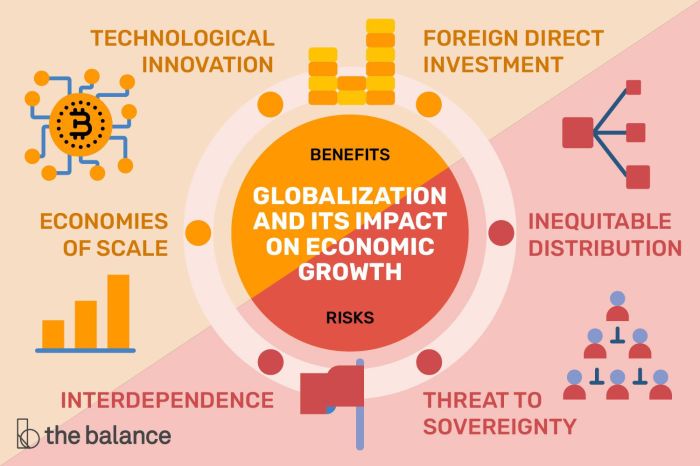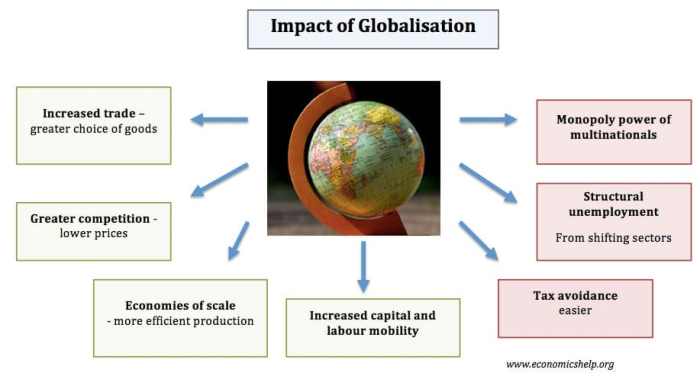Which statement reflects a general implication of globalization – Globalization, a multifaceted phenomenon, has profoundly impacted various aspects of human existence. Its implications are far-reaching, affecting cultural identity, economic interdependence, technological advancements, political landscapes, and environmental dynamics. This article delves into the multifaceted nature of globalization, examining its general implications and their wide-ranging effects.
Globalization has fostered cultural exchange, leading to the preservation and transformation of traditions. It has also accelerated economic interdependence, fostering international trade and investment. Technological advancements have been spurred by globalization, enabling rapid knowledge sharing and innovation. Political implications include the rise of global organizations and transnational issues, shaping international relations.
Finally, globalization has significant environmental consequences, impacting resource consumption and pollution levels.
Impact on Cultural Identity

Globalization has significantly influenced cultural traditions worldwide. Increased global connectivity has facilitated the preservation and transformation of cultural practices.
Cultural diffusion refers to the spread of cultural elements from one society to another. Globalization has accelerated this process through increased travel, trade, and communication. For example, the rise of Bollywood films has led to the dissemination of Indian culture globally.
Cultural assimilation occurs when individuals adopt aspects of a new culture while maintaining their own. Globalization has contributed to assimilation by creating opportunities for cultural exchange and intermingling. For example, immigrant communities often blend their traditional customs with elements of their new home.
Economic Interdependence: Which Statement Reflects A General Implication Of Globalization

Globalization has fostered economic interdependence among nations. Increased trade and investment have created global economic networks that link countries.
Benefits of international trade include access to a wider range of goods and services, lower prices, and economic growth. For example, the North American Free Trade Agreement (NAFTA) has led to increased trade and investment between the United States, Canada, and Mexico.
Challenges of economic interdependence include job displacement, competition from foreign markets, and economic inequality. For example, the outsourcing of manufacturing jobs to developing countries has led to job losses in developed countries.
Technological Advancements
Globalization has accelerated technological innovation and knowledge sharing. Advances in communication, transportation, and access to information have facilitated global connectivity.
The internet has played a crucial role in facilitating knowledge sharing and collaboration. For example, researchers from different countries can now easily share their findings through online platforms.
Improved transportation networks have made it easier to transport goods and people around the world. For example, the expansion of container shipping has reduced transportation costs and increased global trade.
Political Implications

Globalization has influenced international relations and political cooperation. Increased global connectivity has facilitated diplomatic exchanges and the formation of international organizations.
Challenges of globalization include tensions over national sovereignty, conflicts over resources, and the rise of transnational issues. For example, climate change is a global issue that requires international cooperation to address.
Opportunities presented by globalization include increased opportunities for diplomacy, conflict resolution, and global governance. For example, the United Nations serves as a forum for international cooperation and dialogue.
Environmental Consequences

Globalization has had both positive and negative environmental implications. Increased trade and production have led to increased resource consumption and pollution.
Negative environmental impacts include air and water pollution, deforestation, and climate change. For example, the burning of fossil fuels for energy production has contributed to increased greenhouse gas emissions.
Positive environmental impacts include increased awareness of environmental issues and the development of sustainable technologies. For example, the rise of renewable energy sources has reduced reliance on fossil fuels.
Essential FAQs
How does globalization affect cultural identity?
Globalization facilitates cultural exchange, leading to the preservation of traditions while also fostering their transformation and assimilation.
What are the economic implications of globalization?
Globalization promotes economic interdependence, encouraging international trade and investment, but also presents challenges in balancing benefits and mitigating negative consequences.
How does globalization contribute to technological advancements?
Globalization accelerates technological innovation by facilitating knowledge sharing and collaboration across borders.
What are the political implications of globalization?
Globalization influences international relations and political cooperation, presenting opportunities for global organizations to address transnational issues.
How does globalization impact the environment?
Globalization has both positive and negative environmental consequences, affecting resource consumption, pollution levels, and global ecosystems.